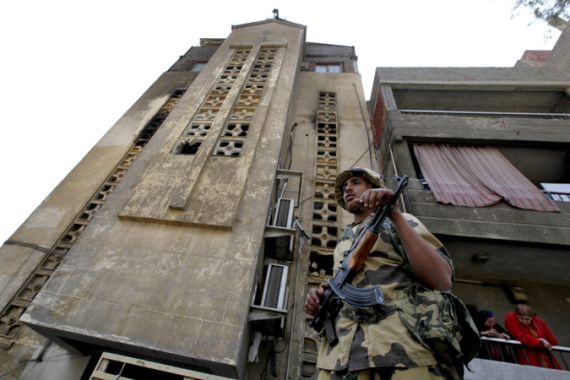Cairo tense after religious clashes
Troops patrol streets as Copts camp out in Egypt’s capital, calling for justice after 12 killed in weekend clashes.

Egyptian troops are out in force in central Cairo after weekend riots left 12 people dead and more than 200 injured.
Authorities on Monday said they have arrested the man behind a protest that sparked two days of sectarian violence.
Ali Yassin Mohamed is among 25 people arrested on Monday and will face a military court. Mohamed is a Muslim and says his wife was kidnapped after converting from Christianity to Islam.
Meanwhile, the Egyptian army is continuing to protect a church set on fire during the sectarian clashes. Services have resumed at St Mary’s church in the Imbaba suburb of Cairo, which was damaged in Saturday’s fire.
Clashes between Muslims and Copts have raised fears that more sectarian strife could erupt in the country which remains under military rule three months after former president Hosni Mubarak was ousted from power.
Al Jazeera’s Jamal El-Shayyal, reporting from the Egyptian capital, said the situation on the ground remained calm but very tense on Monday.
“About 200 Egyptian Christians remain camped outside the state-owned television in what they say is an open-ended sit-in,” he said.
“Some are demanding the resignation of chief military ruler Mohamed Hussein Tantawi, others are just calling for justice to be handed to those who were behind the attacks on the churches in Imbaba.”
‘Critical situation’
Amr Moussa, head of the Arab League, called on the military and the government to act quickly.
“This is a very critical situation. It’s aiming to destroy or damage society and blow up Egypt. This issue cannot be forgiven, it is a really critical situation and it needs to be taken seriously,” he said.
“I am asking the high military council and the Egyptian government to hold a conference to gather academics, Egyptian thinkers and everybody who understands and can help in this critical situation.”
Egypt’s government has announced a series of security measures to curb religious violence, while the army pledged on Sunday that more than 200 arrested people would be tried in military courts over the violence.
The bloodshed began on Saturday evening when word spread around the Imbaba neighborhood that a Christian woman who had converted to Islam had been abducted and was being kept in the Virgin Mary Church against her will.
About 500 ultraconservative Salafi Muslims gathered at the church, calling on Christians to hand over the woman.
Both sides traded gunfire, firebombs and stones, witnesses said.
Soldiers and police fired shots in the air and used tear gas to separate the sides but stone-throwing went on into the night.
‘Salafists blamed’
“The Salafists are being blamed, but who exactly is responsible is not clear,” Al Jazeera’s Rawya Rageh, in Cairo, said.
“The violence is symptomatic of a bigger problem. In fact, it’s about increasing lawlessness in the country since the revolution, and the perception that security forces are being quite lax – not just in dealing with petty crime but with sectarian tension.”
Later on Sunday, hundreds of young Christian men ran through central Cairo towards the main state television building calling for the removal of Tantawi, who leads the military council ruling Egypt.
A crowd of Muslim men met them and some sought to calm the Christians’ anger but fights broke out and the two groups pelted each other with stones.
Saturday’s attack was the latest sign of assertiveness by the Salafists, whose increasing hostility towards Egypt’s Coptic Christians has met with little interference from the country’s military rulers.
Some Christians said security forces had been too slow to disperse the crowd in front of Saint Mina and looked on as the tension got out of hand.
The fighting was Egypt’s worst interfaith strife since 13 people died on March 9 after a church was burned.
Essam Sharaf, Egypt’s prime minister, cancelled a tour of Gulf Arab states to chair a cabinet meeting where the government decided to deploy more security near religious sites and toughen laws criminalising attacks on places of worship.
“Gatherings around places of worship will be banned to protect their sanctity and ensure the security of residents and prevent sectarian strife,” Mohamed el-Guindy, the justice minister, said in a statement read on state television.
Calls for unity
The governor of Giza province, where the targeted church is situated, said relatives of the dead and injured would receive financial compensation.
Hundreds of people gathered in Alexandria on Sunday to call for religious unity and punishment for those who took part in Saturday’s violence.
Al-Azhar, Egypt’s highest religious authority, held an emergency meeting to discuss the clashes, and the Grand Mufti called for a conference of national reconciliation.
In one of the worst attacks against Coptic Christians, a suicide bomber killed 21 people outside a church in the port city of Alexandria on January 1, setting off days of protests.
Tensions have been building for the past year, as Salafists protested the alleged abduction by the Coptic Church of a priest’s wife, Camilla Shehata.
The Salafists claim she converted to Islam to escape an unhappy marriage, a phenomenon they maintain is common.
Shehata’s case was used by the Iraqi branch of al-Qaeda as a justification for an attack on a Baghdad church that killed 68 people.
On Saturday, just before the violence erupted in Imbaba, Shehata appeared with her husband and child on a Christian TV station broadcast from outside of Egypt and asserted that she was still a Christian and had never converted.